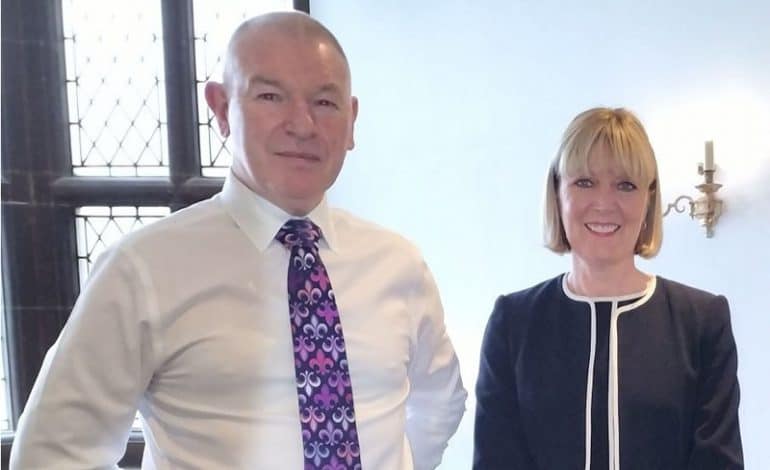A mentorship scheme supporting victims of anti-social behaviour and vulnerable people at risk is to be relaunched under the management of Police and Crime Commissioner Joy Allen.
As part of an overhaul of victim services across County Durham and Darlington, Commissioner Allen is taking overall responsibility for the award-winning Community Peer Mentors project to expand support for victims of crime and antisocial behaviour and those with identified vulnerabilities.
The service supports vulnerable and isolated people affected by significant life-changing events including crime and antisocial behaviour and neighbourly disputes. Without help and appropriate intervention, these individuals have the potential to become high-impact users of frontline services.
More than 300 mentors with lived experiences have already been recruited to the scheme to help inspire confidence and trust in the Police and the wider criminal justice system through their engagement work.
The scheme, managed by Jim Cunningham, has been funded exclusively by the PCC whilst receiving referrals from other providers. Recently there has been a contribution from NHS England to add capacity when supporting those individuals with addictions to drugs or alcohol.
The decision to bring the project under direct responsibility of the PCC rather than an external agency is part of a wider agreement by Commissioner Allen to centralise victim referral services to deliver greater accountability, maximise improvements and ensure support is available when and whenever it is needed.
Commissioner Allen said: “The Community Mentor Peers project continues to grow, making a huge difference to the lives of vulnerable people in County Durham and Darlington. The scheme already has an impressive track record of reducing dependency on frontline services, cutting offending and hospital admissions and reintegrating people back into society and we are determined to take this further.
“Our new model of victim care will help us to streamline all victims’ services and improve collaboration and information-sharing between partners while also providing greater scrutiny over performance. It could also open the door to further investment from partners to enable us to deliver services like Community Mentor Peers more widely where it is needed.
“Victims of crime are at the core of everything I do and I am determined to make it easier for people to reach out for the help they need – at the earliest opportunity. It makes sense to offer a single front door approach to support and I believe these changes will benefit the recovery journey of all victims in the future.”
Manager Jim Cunningham added: “This is an extremely exciting time for the whole Community Peer Mentor team as we become an integral part of the PCC’s office. We provide additional and ongoing support for those affected by ASB, as well as anybody who feels vulnerable or isolated owing to events in their lives where they feel they are not receiving the support they need.”
The new centralised referral model will also incorporate restorative justice interventions to victims of crime which will again be fully funded by the PCC.
Restorative justice enables victims of crime to meet perpetrators to seek closure and redress for their experiences while aiding the rehabilitation of the offenders.
Background information
The scheme was originally introduced under the late Police and Crime Commissioner, Ron Hogg, to address serial repeat callers that were placing significant demands on the 101 service.
Community Peer Mentors aim to empower change, reduce vulnerability and provide a voice for the unheard. This support is given to anyone whatever their background or circumstances, whether victim, survivor, perpetrator, prison leaver or someone forgotten or neglected by society. Support will be provided for those seeking to change.
This unique approach has seen (on average) an 81% reduction in contact with public services, reduced offending, and hospital admissions, assisted reintegration back into society, people in disappear returning to employment and education, learning new skills and coping technique’s, identifying without this support they would have taken their own lives.
This is non-time specific support which is unique and bespoke for every client. Community Peer Mentors believe every person’s experience, story, fears and feelings are different, and therefore one size does not fit all.
Awards
Local: Durham Constabulary, the lead for Problem Solving Policing (POP) holds its own ‘POP’ Awards annually. The Pop Conference celebrates innovative problem-solving projects that have tackled issues in communities and transformed ways of working across police and partner agencies in County Durham and Darlington. The Community Peer Mentors took the award in 2018.
National: The Tilley Awards, named after Professor Nick Tilley, of the Department of Security and Crime Science at University College London. The aim is to build on the work to reduce demand by embedding a structured problem-solving ethos and capability nationally. The winners of this automatically represent the UK at the Goldstein Awards. The Community Peer Mentors won this in 2019.
International: The Herman Goldstein Awards are held in the USA. The Award recognises outstanding police officers and police agencies that engage in innovative and effective problem-solving efforts and achieve measurable success in reducing specific crime, disorder, and public safety problems. This international competition is named after the founder of problem-oriented policing, University of Wisconsin Emeritus Professor Herman Goldstein, and administered by the Centre for Problem-Oriented Policing. The Community Peer Mentors were finalist in 2019.








